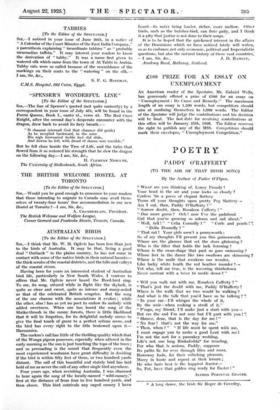AUSTRALIAN BIRDS
[To the Editor of the SPECTATOR.] Sin,—I think that Mr. W. H. Ogilvie has been less than just to the birds of Australia. It may be that, living a good deal " Outback " in the plains country, he has not come in contact with some of the native birds in their natural haunts— the thick scrubs of the coastal districts, and the hills and valleys of the coastal rivers.
Having been for years an interested student of Australian bird life, particularly in New South Wales, I venture to affirm that Mr. Ogilvie never heard the Reed-bird sing. To me, its song, uttered while in flight like the skylark, is quite as clear and sweet, quite as intense and many-noted as that of the celebrated British songster. But the song of the one charms with the associations it evokes ; while the other, alas ! has as yet no poet to endow its melody with added sweetness. When one has heard the song of the Shrike-thrush in the sunny forests, there is little likelihood that it will be forgotten, for its delightful melody seems to give the final touch of grace to a perfect sylvan scene, and the bird has every right to the title bestowed upon it— Harmonica.
The cuckoo's call has little of the thrilling-quality which that of-the Wonga pigeon possesses, especially when uttered in the early morning as the sun is just touching the tops of the trees ; and so persuading is the sound that frequently even the most experienced woodsmen have great difficulty in deciding if the bird is within fifty feet of them, or two hundred yards distant. The call of this beautiful and stately bird has laid hold of me as never the call of any other single bird anywhere.
Four years ago, when revisiting Australia, I was charmed to hear again the song of the locally-named " wild-canary," first at the distance of from four to five hundred yards, and then closer. This bird outrivals any caged canary I have heard—its notes being louder, richer, more mellow. Other birds, such as the butcher-bird, can flute gaily, and I think it a pity that justice is not done to their songs.
It is to be hoped that the quickened interest in the affairs of the Dominions which we have noticed lately will widen, so as to embrace, not only economic, political and Imperialistic questions, but also the natural history of these vast countries,' —I am, Sir, &c., J. D. RAMSAY. Academy Road, Rothesay, Scotland.


































 Previous page
Previous page